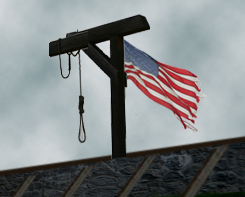Home / Death Penalty

On December 13, 2006, Angel Diaz of Puerto Rico was executed by lethal injection in Florida. It took 34 minutes to kill him.
An autopsy later revealed that the IVs inserted into Diaz were faulty, the drugs were injected into his tissues, not his veins, and they also were released in the wrong order so that Diaz received the last, painful drug before he should have. The autopsy revealed a foot-long chemical blister in his body tissue.
Gov. Jeb Bush ordered an investigation and a moratorium on executions ensued. Fast forward to Tuesday when Florida will resume killing inmates by lethal injection. [More...]
(5 comments, 351 words in story) There's More :: Permalink :: Comments
Here's a thought:
It's the job of the government to be thoughtful and rational in dealing with criminals.
An editorial in The Des Moines Register chastises both presidential candidates for criticizing the Supreme Court's decision prohibiting execution as punishment for sex crimes that do not cause death.
Wednesday's ruling is a victory because it further narrows the reach of the death penalty, an uncivilized practice in 21st-century America. ... Killing criminals, whether murderers or rapists, accomplishes nothing. The Supreme Court - and the country - should be working toward abolishing the death penalty, not finding new opportunities to apply it.
(24 comments) Permalink :: Comments
You'd think military prosecutors would want to get it right the second time.
The Army is trying [Army Sgt. William] Kreutzer for the second time on capital murder, attempted murder and other charges stemming from an October 1995 shooting spree in which Kreutzer opened fire on a brigade of soldiers as they prepared for an early morning run. ... Kreutzer was sentenced to death at a court-martial in 1996, but he won a new trial after military appeals courts ruled in 2004 and 2005 that his first lawyers were incompetent.
Kreutzer's new lawyers have no experience defending the death phase of a trial. They've asked the court "to appoint qualified lawyers or make the case non-capital." Prosecutors responded that the lawyers are good enough. Are they inviting a repeat performance of the first appeal? [more ...]
(5 comments, 288 words in story) There's More :: Permalink :: Comments
A former police chief who was convicted of murdering his ex-wife has been spared the death penalty.
After listening to the wishes of the victim’s family, Northumberland County District Attorney Tony Rosini withdrew his plan to seek the death penalty and recommended the defendant receive life imprisonment without parole for murdering his ex-wife.
It's always heartening to see a murder victim's family choose to set aside the natural desire for "life for a life" vengeance and to accept confinement as an appropriate punishment.
(19 comments) Permalink :: Comments

James Earl Reed, 49, was executed by electric chair in South Carolina last night.
When the curtain to the death chamber was drawn, Reed was seated in a chair in the middle of the room, with leather straps at his wrists, biceps, chest, waist and ankles. A prison official placed a brown hood over Reed's face, on which there was also a cap connected to the ceiling by a thick, black cable.
A series of thumps followed a moment later, as Reed clenched his fists and his body stiffened, lurching back in the chair. Several minutes later, Reed's body relaxed and slumped forward slightly.
A technician then entered the chamber to disconnect the cable from Reed's head, and a physician checked his pulse and pupils before officials announced the time of death.
Reed had fired his lawyer and represented himself at trial. There were last minute appeals based on this week's Supreme Court ruling on self-representation at capital trials, to no avail.
States that have killed inmates since the Supreme Court ruling in Baze v. Rees: Georgia, Mississippi, Virginia, Texas, Oklahoma and South Carolina.
(9 comments) Permalink :: Comments
Reacting to a court's decision that Ohio law precludes using a mixture of three drugs to execute prisoners, The Plain Dealer invites Ohioans to reconsider the death penalty:
There is always the danger, despite safeguards in the criminal justice system, that an innocent person will be killed. The road to the death chamber is usually long and expensive. Survivors of a heinous crime may never get the closure they desire. The state is put in the awkward position of taking life in the name of protecting it. And then there are the death chamber embarrassments - procedures that take longer than anyone can stomach in part because they're done by nonmedical personnel using rudimentary equipment.
According to The Plain Dealer, "the death penalty - however administered - has no place in 21st century Ohio."
(5 comments) Permalink :: Comments
You wouldn't have wanted to be Charles Dean Hood last night.
Hood waited in a holding cell adjacent to the death chamber in Huntsville for hours while lawyers with the Collin County district attorney's office sought his execution and Hood's lawyers tried to prevent the death sentence from being carried out.
You'll remember Hood is the defendant who was sentenced to death by the judge who was allegedly having an affair with the district attorney who prosecuted Hood's case. The death warrant was recalled after Hood raised the issue, only to be reinstated by the state's highest court. But the wrangling lasted so long that the warrant expired before Hood could be executed.
"Only in Texas," said Lawrence Fox, who teaches law at Harvard University and the University of Pennsylvania.
(3 comments) Permalink :: Comments
Charles Hood will be executed on Tuesday unless a court or Texas Gov. Rick Perry acts to prevent his death. In light of allegations of a blatant conflict of interest on the part of the judge who presided over Hood's trial, the execution should be stayed or the death sentence should be commuted.
Lawyers for a Texas inmate facing execution next week filed court papers on Thursday accusing the judge at his double-murder trial of having an affair with the prosecutor. The papers, filed in the Texas Court of Criminal Appeals, argue that the relationship between the judge, Verla Sue Holland, and the man who was district attorney of Collin County, Tom O’Connell, should nullify the conviction of the inmate, Charles Hood, in 1990. ...The petitions include an affidavit from a former assistant district attorney, Matthew Goeller, who said that the six-year relationship between Judge Holland and Mr. O’Connell was “common knowledge” and that it raised “reasonable doubt on the judge’s capacity to act impartially.”
Even supporters of the death penalty should agree that nobody should be sentenced to death by a judge who is sleeping with the prosecutor.
(17 comments) Permalink :: Comments


Karl Chamberlain was executed in Texas tonight, the first texecution since the Supreme Court ruled the three drug lethal injection cocktail does not violate the Constitution's ban on cruel and unusual punishment.
It took 9 minutes to kill Chamberlain. He made a last statement which included:
"I am so terribly sorry. I wish I could die more than once."
Chamberlain ordered the largest last meal of any death row inmate in Texas history. [More...]
(19 comments, 402 words in story) There's More :: Permalink :: Comments

Judge James Burge in Ohio has ruled that Ohio must change its three drug execution cocktail to a single dose of barbiturates if it wants to continue executions.
He based the ruling on Ohio law that mandates the use of “a drug or combination of drugs of sufficient dosage to quickly and painlessly cause death.”
The Supreme Court in Baze v. Rees refused to find the three drug cocktail, which veternarians won't use in dogs, unconstitutional. [More...]
(8 comments, 211 words in story) There's More :: Permalink :: Comments
Could legislative mindsets really be changing? Raymond Lesniak, a New Jersey state legislator, regretted his 1982 vote to reinstate the death penalty.
He did so, he says, not because he thought it was right, but because he was afraid that if he did not support capital punishment, the voters would punish him. Over time, Mr. Lesniak, a Union County Democrat who rose to the State Senate in 1983, became haunted by his decision, by the immorality of putting people to death, and by the possibility that an innocent person would be executed under the law that he supported.
New Jersey abolished the death penalty last year, a legislative accomplishment that Lesniak championed. What about his fear of being punished by voters who might think him "soft on crime"?
Mr. Lesniak’s constituents were not nearly as angry with him as he had feared. He concluded that elected officials are much freer than they believe to vote their conscience.
Sometimes leaders need to lead. It's easy to take opinion polls and to play it safe, but on an issue of life and death, it isn't a bad thing for a politician to vote his conscience ... assuming he has one.
(18 comments) Permalink :: Comments
Percy Levar Walton was scheduled for execution tomorrow. Virginia Governor Timothy Kaine today commuted his sentence to life without parole.
Walton has a history of mental isslness that has gotten progressively worse while in prison. Kaine determined Walton is mentally incompetent, not fully aware of the punishment he is about to suffer and why he is to suffer it. While Kaine issued temporary stays for Walton in the past, today he issued his final decision and commuted the sentence.
Gov. Kaine's statement is here.
"After reviewing the information, I was compelled to conclude that Walton was seriously mentally impaired and that he met the Supreme Court's definition of mental incompetence. Because one could not reasonably conclude that Walton was fully aware of the punishment he was about to suffer and why he was to suffer it, I decided that his execution could not proceed at that time.
(14 comments, 276 words in story) There's More :: Permalink :: Comments
| << Previous 12 | Next 12 >> |







